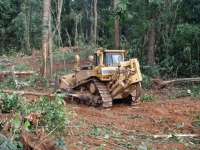Cameroon Palm Oil Plantation Withdraws Sustainability Application

A subsidiary of Herakles Capital, a New York based investment firm, has decided to cancel its application to join the Roundtable on Sustainable Palm Oil (RSPO) after environmental groups alleged that its 73,086 hectare project in southwestern Cameroon would threaten the sustainability of the local community.
In 2009, the SG Sustainable Oils Cameroon, Ltd. (SGSOC), which is wholly owned by Herakles Capital, acquired a 99 year lease to land in Ndian and Kupe-Manenguba divisions where it drew up plans for a $350 million palm oil plantation. (Herakles Capital has several other investments in Africa such as the Bujagali dam in Uganda, the Boke Alumina Project in the Republic of Guinea and an East African undersea fiber-optic project.)
"From its very name, American-owned SG Sustainable Oils Cameroon, Ltd. (SGSOC) presents a pro-environment, pro-resources image," writes Frederic Mousseau, policy director of the Oakland Institute in California in a new report released this week. "(But it) is also part of a strategy to deceive the public into believing that there is logic to cutting down rainforests to make room for palm oil plantations."
SGSOC has gone to great lengths to convince the public that it is socially responsible. "Our project, should it proceed, will be a big project with big impacts - environmentally and socially," Herakles CEO Bruce Wrobel wrote to the Oakland Institute in July 2011. "The big question - and the real story - is whether it ends up strongly positive or strongly negative. I couldn't be more convinced that this will be an amazingly positive story for the people within our impact area."
In addition to Herakles, Wrobel operates a non-profit dedicated to poverty reduction named "All for Africa" that boasts board members like Nigerian-American actor Gbenga Akinnagbe who shot to fame in The Wire, a U.S. TV series, and the film: The Taking of Pelham 123.
And SGSOC also applied to join the international Round Table on Sustainable Palm Oil (RSPO), which has signed up 779 members and associates including almost every major industry player in the world, in an effort to burnish its social responsibility credentials.
Indeed RSPO was created in 2004 to address the numerous clashes over palm plantations around the world with the help of non-government organizations such as the World Wildlife Fund which helped set up the organization.
But the palm oil industry - which produces 50 million tons of edible oils and biofuels a year - remains deeply controversial.
As CorpWatch writer Melody Kemp noted in her recent article for us "Green Deserts: The Palm Oil Conflict" the plantation companies make money in two ways: First they clear cut and sell the existing high-value trees, burning the residue. The haze from those forest fires has interrupted regional air traffic and caused severe respiratory illnesses in countries like Indonesia, Malaysia as well as Singapore. Then the companies plant the spiky oil palms trees, creating vast, eerily silent monoculture plantations.
Activists have sparked a raging debate over the industry, faulting palm oil for contributing significantly to carbon dioxide and methane emissions, the loss of biodiversity and precious carbon sequestering forests, land subsidence, poverty, and for exacerbating starvation resulting from land appropriation.
The very same problems have been predicted in an Environmental and Social Impact Assessment (ESIA) conducted by SGSOC itself. The company assessment suggested that the negative impact of the plantation on livelihoods will be "major" and "long-term."
Nor is the Herakles investment the most efficient way to support the local economy, according to a report by on the SGSOC deal by two Cameroonian NGOs, the Centre for Environment and Development (CED) and Réseau de Lutte contre la Faim (RELUFA). The groups calculated that the government of Cameroon could generate 13 times more employment and significantly larger tax revenue if it were to require local bread-makers to use 20 percent locally produced flour (derived from sweet potatoes, corn or cassava), using just 15,000 hectares of land.
Local farmers and politicians are especially skeptical of SGSOC because palm oil plantations are not new to the region. Beginning in 1927, companies like Pamol have operated similar projects for decades. "Plantation jobs have always been modern day slavery," says Joshua Osih of the Social Democratic Front, Cameroon's main opposition party, in an interview for the film "The Herakles Debacle" just released by the Oakland Institute. "We've seen a lot of industrial plantations develop around this area and nothing, absolutely nothing, has happened positively to the population."
"Everybody here is self employed," Okie Bonaventure Ekoko, a cocoa farmer from Mboko village told the film maker Franck Bieleu. "There is no advantages that the people here will have (from Herakles investments). We don't need them, we are fine."
"And if they come and say they want to take this land from us, we are not ready for it," says Esoh Sylvanus Asui, a farmer from Bombe Konye village. "We will fight and we will die for our land."
In May 2011, some 50 local and international environmental and community groups wrote a letter to Wrobel expressing concern. In March 2012 a number of the same groups lodged a formal complaint against Herakles with the RSPO alleging that Herakles' project violated Cameroonian laws and noted that it "would disrupt the ecological landscape and migration routes of protected species." Meanwhile local farmers have begun to organize against the project. On June 6, 2012, villagers from Fabe and Toko held a protest against the plantation during the visit of the local governor.
On August 24 2012, Herakles withdrew its application to the RSPO.
"The RSPO regrets this withdrawal of membership by Herakles Farms," the organization said in a brief statement posted to its website. "This action pre-empts recommendations from the RSPO Complaints Panel to further verify the allegations made by the complainants."
The company did not respond to requests for comment from the media.
- 183 Environment



